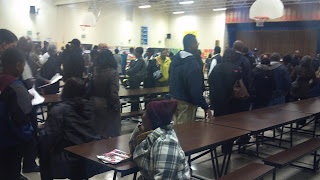The President mentioned in his victory speech that we "have to fix" the situation at the polls for those who waited "in line a long time." Whatever your politics are, you have to agree with that sentiment - people in Miami were waiting in line past midnight. No wonder that Florida wasn't called on election night coverage - this may be the first time that people voted after Election Day. (It also explains makes me feel better about the late timing of that speech and the concession speech - I can't imagine waiting in line to vote after an election had already been conceded.)
 |
| Voters wait in a two-hour line inside a Maryland polling place |
When one of the election officials offered a copy of the seven Maryland ballot questions and several county charter amendments to anyone who hadn't read them yet, dozens of hands shot up. I then noticed that many people were taking upwards of fifteen minutes in the booth. It was then that I realized for those that didn't read the questions (or my blog posts) beforehand, it could be a daunting experience to read, analyze and decide a position on each question on the fly. Unlike most other places on modern life, cell phones, computers and other "communication devices" are banned in Maryland voting locations (presumably to prevent voter fraud.) This also prevents someone from phoning a friend or looking up ballot question analysis on a smart phone to help them decide how to vote. It may be a good idea to ban these devices, but the end result is that many have to make decisions on the fly. I was surprised to see this, and I wondered once again about the value of having voters decide complex legislative matters.
There's always a way to improve things - I daydreamed about possible reforms, such as having copies of ballot questions offered to all voters as they walk into the polling station, or perhaps a separate line for those who hadn't made their choices before entering the polling place. I'm not sure if that same dynamic was happening in Florida, but I don't think that it's too much to ask that we set up a system that allows any voter who gets into line before closing time to be able to enter their vote before election day ends. As of 2012, 32 states and DC allow people to vote in person prior to the official Election Day and 27 states and DC allow no-excuse absentee ballots for mail-in votes (Oregon and Washington are all-mail.) If things are too complicated for the average voter to process on the fly, maybe these forms of voting can remove some of the time pressure on individuals.
In the end, Maryland voters approved every ballot question - I related to the comedian's joke that many voters just wanted to click "I agree" on the bottom of the electronic ballot as if it were a too-long service agreement for an online computer program. My original thought stayed the same - if we are asking too much of the voter, then it may be time to ask more of the legislators.
How long did you wait to vote, and what reforms would you like to see? Comment below and share your reaction on twitter and facebook.

Comments
Post a Comment